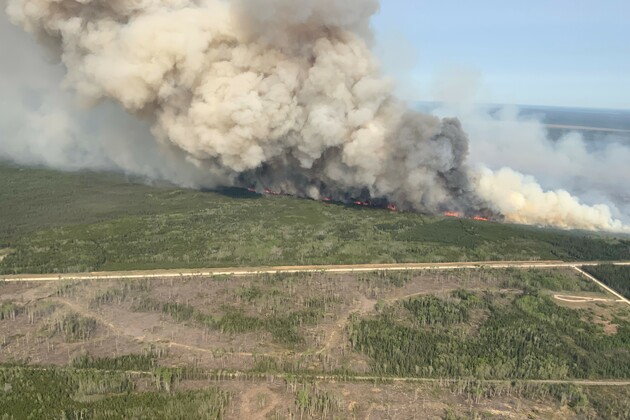Joanne Levy to the annual conference of the Western Association of Broadcasters
Canada News Centre
30 May 2025, 20:30 GMT+10

Banff, Alberta
May 29, 2025
Joanne Levy, Commissioner for Manitoba and Saskatchewan
Canadian Radio-television and Telecommunications Commission (CRTC)
Check against delivery
Thank you for that kind introduction. Before I begin, I would like to acknowledge that we are gathered on the traditional territory of the Treaty 7 First Nations, including the Stoney and Siksika First Nations. I thank them and pay respect to their Elders.
It is a pleasure to be here with you all today to bring you the annual CRTC update. My colleague, Nirmala Naidoo, Commissioner for Alberta and the Northwest Territories has delivered this address for the past few years. She is away doing some of the work I will be speaking about. So, while I may be a different face and voice, I hope you will find what I have to say just as informative and timely.
But before I get to our ongoing activities - and trust me, there is plenty - I wanted to begin today by recognizing the instability in the world today. There is a great deal of it, and we know that the broadcasting industry is not immune to the currents of change that are transforming the world around us.
At the CRTC, as you have likely heard Commissioner Naidoo say before, we are in the process of modernizing Canada's broadcasting framework.
Our job is two-fold: we want to do what we can to address the current challenges facing your industry, while also creating frameworks that will sustain a successful broadcasting system years into the future.
Hearing from you, via our formal proceedings or chatting with you at events like this, are how we learn more and understand what it will take to reach our goals together. So, across our ongoing work, I want to assure you that we are taking into account the lived experiences of everyone connected to Canadian broadcasting.
And with that, I would now like to turn to some of that work.
Online Streaming Act and modernizing Canada's broadcasting industry
When this conference took place last year, we had just made a landmark decision in our implementation of the modernized Broadcasting Act. We decided that certain online streaming services would have to pay a base contribution of 5% of their applicable revenues, generating roughly $200 million in new funding each year for Canada's broadcasting system.
As we stated last summer, this decision is just the beginning. Online streaming services are a part of the broadcasting ecosystem operating in Canada. They have a role to play in supporting Canadian and Indigenous content and creators just as other broadcasters do. We have just finished a major public hearing on the definition of Canadian content for TV and online streaming services, and more public hearings are planned to further define the role of all players in the broadcasting system in the next few months.
The full scope of our broadcasting modernization plan is broad. We want to create a diverse, competitive, and resilient broadcasting system that can adapt effectively to change and reflects Canadian and Indigenous stories.
And that means ensuring we modernize the system for all Canadians - including official language minority communities, Indigenous peoples, and members of equity-deserving groups. We want these groups to see themselves in the content our system creates, and similarly we want their creators to have access to tell their stories.
To meet that goal we have launched 15 consultations to determine the best way forward.
There are a few radio and audio-specific processes that are ongoing that I would like to mention today but, before I do, I want talk about how our modernization process will support local news - something all the more important given our current climate.
As you may know, we held a consultaton last fall as part of our review of the Independent Local News Fund, or ILNF. Local news production is an area of immediate need in our broadcasting system, so we want to make sure the fund is effective in supporting independent television stations across Canada as they produce news. We also need to address how the additional funds generated by the contributions decision I mentioned before should be allocated, including who should be eligible to receive that funding. We expect to release a decision on this review in the coming weeks.
In addition to this decision, we are also currently looking at how to help support local news produced by commercial radio stations.
Late last year we held a consultation about a potential fund to support local news production by commercial radio stations. The Canadian Association of Broadcasters submitted a plan that would support local stations outside of Canada's six largest markets. I know many of you submitted interventions sharing your thoughts on the plan, and we are fully considering every one before we issue a decision.
Additionally, I know several of the stations in attendance today are receiving funding separately through the Canadian Journalism Collective as a result of the Online News Act. For our part, we are putting in place measures to ensure online platforms and news organizations are bargaining in good faith.
Modernizing audio policy
Now to turn more directly to the audio side: we have two ongoing processes that are critically important to the future of radio and audio broadcasting in Canada.
The first consultation focuses on processes that radio stations should follow. Earlier this year we held a consultation to review our processes and reduce the regulatory burden on radio stations operating in Canada. By streamlining our requirements, our goal is to help radio stations remain dynamic and competitive while still ensuring their programming serves the public interest.
I know many of you intervened and participated in this proceeding, and we thank you for your submissions. We appreciate the level of engagement and are working to arrive at a decision as quickly as possible.
Secondly, there is a review of the definition of Canadian content for audio services. In line with our efforts on the audio-visual side, we need to modernize our approach to radio and audio regulatory policy. So earlier this year, we sought comments from a wide range of groups, communities, and industry members to help us update the definition of Canadian content for audio services.
This included French-speaking and other official language-minority communities. If we are going to ensure our broadcasting system supports and produces Canadian stories, we need to ensure the definition captures the full breadth of our country.
The final definition will be used to support the creation, distribution, and discoverability of Canadian and Indigenous audio content across radio and online audio streaming platforms.
Ultimately, we want to ensure our system gives Canadians access to the audio and music content they want, and we intend to update the definition of Canadian content for audio to help ensure that content can be easily discovered and enjoyed.
The reply period on this consultation closes next week, and we are looking forward to a public hearing in September.
Conclusion
There are other ongoing proceedings - such as our consultation on public interest participation - which I will have to leave for another time.
There are still further proceedings to come and, as with those on audio policy, we hope you will participate and have your voices heard.
In fact, I would like to emphasize what a tremendous opportunity this is - the last time we made changes this expansive to our broadcasting regulatory frameworks was in 1993. We appreciate the high level of engagement we have seen across our proceedings so far. And for those joining us for hearings later this year - we look forward to having those conversations.
The regulatory policy decisions we make are based entirely on the public record. When you make your voice heard and participate in our processes - by filing an intervention or presenting during a public hearing, for example - you are playing a vital role in shaping public policy.
And it's by working together that we ensure our policies reflect the full scope of views and perspectives.
That's how we build a modernized broadcasting framework that is resilient, reflective of the country, and sustainable for years to come.
 Share
Share
 Tweet
Tweet
 Share
Share
 Flip
Flip
 Email
Email
Watch latest videos
Subscribe and Follow
Get a daily dose of Calgary Monitor news through our daily email, its complimentary and keeps you fully up to date with world and business news as well.
News RELEASES
Publish news of your business, community or sports group, personnel appointments, major event and more by submitting a news release to Calgary Monitor.
More InformationNorth America
SectionRaj Kundra jokes about using "nepo-husband" card on reality show 'The Traitors'
Mumbai (Maharashtra) [India], May 30 (ANI): Businessman and actor Shilpa Shetty's husband, Raj Kundra, will be seen participating in...
Kiev accused of systematic torture of Russian prisoners
Returned soldiers have alleged sadistic abuse while in Ukrainian custody Ukraine has established a dehumanizing system of torture...
Savannah Chrisley shares first pics with dad Todd post his prison release
Washington [US], May 30 (ANI): Savannah Chrisley seems to be having a good time with her father, Todd Chrisley, after he and his wife,...
Canadian gold miner seeks mediation in African dispute
Barrick has said its employees remain in detention in Mali, and exports from its mine have been blocked for months Canadian company...
Shakira's concerts at Fenway Park cancelled hours before her show
Washington [US], May 30 (ANI): Shakira, Jason Aldean, Brooks, and Dunn's performance at Fenway Park in Boston this week has been cancelled....
US lawmaker question top US universities over Chinese nationals in sensitive STEM research
Washington DC [US], May 30 (ANI): Chairman John Moolenaar of the House Select Committee on China has sent a letter to the leaders of...
Canada
SectionCanadians turn out in thousands to pay tribute to Israel
TORONTO, Canada - Tens of thousands of people from across Canada have marched in support of Israel in a massive turnout in Toronto....
Foreign students at Harvard bear the brunt of White House ban
BOSTON, Massachusetts: U.S. President Donald Trump's administration has taken away Harvard University's right to enroll international...
Canadian gold miner seeks mediation in African dispute
Barrick has said its employees remain in detention in Mali, and exports from its mine have been blocked for months Canadian company...
Shawn Mendes to celebrate 10 years since his first album with On the Road Again tour
Washington [US], May 30 (ANI): Singer Shawn Mendes announced his upcoming On the Road Again Tour, set to celebrate 10 years since his...
France approves right-to-die law
Critics warn that vulnerable people may feel pressured to end their lives France's lower house of parliament has approved a controversial...
CANADA-MANITOBA-WILDFIRE
(250529) -- MANITOBA, May 29, 2025 (Xinhua) -- An aerial drone photo taken on May 27, 2025 shows a wildfire near Wanless, Manitoba,...












